CCEE Press: Safeguarding a land where justice resides
Monday, 23 September 2013, 15:38 If we are not aware that we are teachers of a true human ecology, we will not be prophets of a responsible environmental ecology. Human and environmental ecology are closely linked. Protection of the environment – a gift to be wisely safeguarded and managed – is above all defence of the human person from self-destruction. Issues linked to safeguarding creation are very closely connected to the theme of the integral development of the human person: these are the conclusions from the study seminar in Luxembourg promoted by the “Caritas in veritate” Commission.-
See also:
- The Prime Minister meets with the Head of the UGCC and the President of the Council of Bishops' Conferences of Europe
- Archbishop Gintaras Grušas visits Patriarchal Cathedral of the Resurrection and meets with UGCC Head
- President of the Council of European Bishops' Conferences Archbishop Gintaras Grušas visits wounded Ukrainian soldiers
The “Safeguarding Creation” section of the “Caritatis in veritate” Commission of the Council of European Episcopal Conferences (CCEE) resumed its reflections with the study seminar held in Luxembourg on 18 September.
The meeting, hosted by the local Archbishop, Mgr Jean-Claude Hollerich, saw the participation of a number of experts from Bishops’ Conferences in Europe, from the Holy See, and from the Secretariat of the European Christian Environmental Network (ECEN).
Resuming the path undertaken in recent years, the meeting was an opportunity to deepen the commitment of the European episcopate in safeguarding creation in the light of the numerous interventions made by Pope Francis, who, through his on-going magisterium, reminds Christians of this responsibility.
The meeting began with an address on the Church’s mission in care for creation from a theological, anthropological, ethical and educative perspective from Mgr André Léonard, Archbishop of Malines-Brussels and head of this Section. He stated that “safeguarding creation is a lofty expression of Christian charity” which cannot be achieved without safeguarding the metaphysical dimension of human life, as the theologian von Balthasar noted. In addition, Mgr Léonard emphasised that the commitment of every Christian in safeguarding creation starts from knowing that the present universe is only a stage on the path towards “the new heavens and the new earth”.
Subsequently, the participants focussed on the social and economic dimensions of protecting the environment with an address from Mr Stanislas de Larminat, for many years Director General of an agro-industrial business in France. He spoke of the need to reiterate the concept of economic solidarity towards the future generations, because it is “morally unlawful and economically counter-productive to lay the burden and consequences of our current choices on future generations”.
The meeting was also an opportunity for discussion and exchange of information and good practice among the participants. Emerging from this were a variety of not always shared opinions on some of the issues discussed, which nevertheless highlighted the fundamental mission of the Catholic Church in educating in the integral safeguarding of creation. In addition, the importance for all Catholics involved in this area to have recourse to trustworthy sources of scientific information in order to guarantee debate more appropriate to the aforementioned mission of the Church also emerged.
The Church’s interest in the theme of creation is not new and is well-rooted at national and local levels. There are numerous diocesan and parish initiatives. However, what emerges more and more is the educative challenge of re-establishing above all the relationship between the human creature and its Creator. Where this relationship is missing, creation is reduced to matter to be possessed and the aim of human existence, or even that of a nation, is reduced to its capaity to possess as much as possible, even at the cost of creating injustice and conflict.

We can imagine what the prayer of the prisoners in the Russian torture centers in the Ukrainian Kharkiv region was like – Head of the UGCC on the 206th day of the war 17 September
A vast cemetery, a mass burial, was found near the city of Izyum, in which more than 400 innocently killed and tortured people have already been...
-
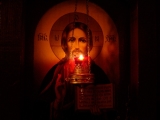 Глава УГКЦ у 158-й день війни: «Нехай Господь прийме з уст нашої Церкви псалми та моління за всіх тих, які особливо просять нашої молитви»
Глава УГКЦ у 158-й день війни: «Нехай Господь прийме з уст нашої Церкви псалми та моління за всіх тих, які особливо просять нашої молитви»
-
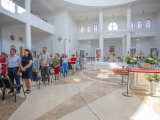 «Сила, яка походить із вірності Христові, є стержнем, який ніхто не може зламати», – Блаженніший Святослав
«Сила, яка походить із вірності Христові, є стержнем, який ніхто не може зламати», – Блаженніший Святослав
-
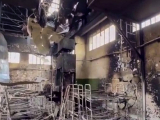 Глава УГКЦ у 157-й день війни: «В ім’я Боже ми засуджуємо звірства в Оленівці і світ повинен це засудити як особливий вияв дикості й жорстокості»
Глава УГКЦ у 157-й день війни: «В ім’я Боже ми засуджуємо звірства в Оленівці і світ повинен це засудити як особливий вияв дикості й жорстокості»
-
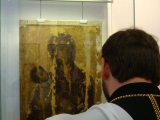 «Боже, почуй наш плач і поспіши нам на допомогу і порятунок!», – Глава УГКЦ у 156-й день війни
«Боже, почуй наш плач і поспіши нам на допомогу і порятунок!», – Глава УГКЦ у 156-й день війни
-
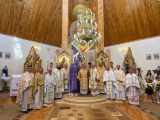 «Бог йому дав серце і душу українського народу»: відбулася щорічна проща до Прилбичів з нагоди уродин митрополита Андрея Шептицького
«Бог йому дав серце і душу українського народу»: відбулася щорічна проща до Прилбичів з нагоди уродин митрополита Андрея Шептицького
-
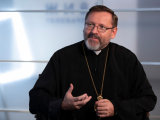 Глава УГКЦ: «Я горджуся українськими патріотами, які без найменшої краплі ненависті готові захищати своє»
Глава УГКЦ: «Я горджуся українськими патріотами, які без найменшої краплі ненависті готові захищати своє»
-
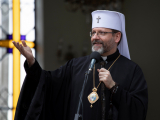 Блаженніший Святослав закликав українську молодь скласти присягу на вірність Христові
Блаженніший Святослав закликав українську молодь скласти присягу на вірність Христові
-
 Глава УГКЦ у 155-й день війни: «Помолімося, щоб не втратити скарбу віри князя Володимира»
Глава УГКЦ у 155-й день війни: «Помолімося, щоб не втратити скарбу віри князя Володимира»
-
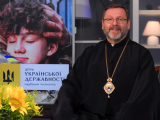 Блаженніший Святослав у День державності України: «Наша Держава – це для нас питання життя або смерті»
Блаженніший Святослав у День державності України: «Наша Держава – це для нас питання життя або смерті»
-
 Глава УГКЦ у 154-й день війни: «Нехай Господь Бог прийме у свої вічні обійми журналістів, які віддали за правду своє життя в Україні»
Глава УГКЦ у 154-й день війни: «Нехай Господь Бог прийме у свої вічні обійми журналістів, які віддали за правду своє життя в Україні»
-
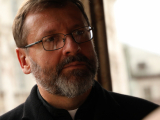 Глава УГКЦ у 153-й день війни: «Принесімо наш біль перед Боже обличчя і будьмо певні, що Він нас вислухає»
Глава УГКЦ у 153-й день війни: «Принесімо наш біль перед Боже обличчя і будьмо певні, що Він нас вислухає»
-
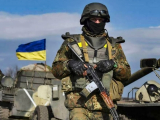 Глава УГКЦ у 152-й день війни: «Помолімся молитву заступництва за наших воїнів»
Глава УГКЦ у 152-й день війни: «Помолімся молитву заступництва за наших воїнів»
-
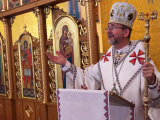 «Віруюча людина не може бути байдужою, коли бачить страждання іншої людини», – владика Богдан Дзюрах
«Віруюча людина не може бути байдужою, коли бачить страждання іншої людини», – владика Богдан Дзюрах
-
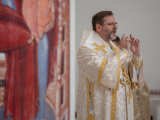 «Серед нашого страждання творімо простір для прояву Божої всемогутності», – Глава УГКЦ у 6-ту неділю після П’ятдесятниці
«Серед нашого страждання творімо простір для прояву Божої всемогутності», – Глава УГКЦ у 6-ту неділю після П’ятдесятниці
-
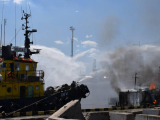 Глава УГКЦ у 151-й день війни: «Російське віроломство ми перемагаємо силою любові до нашої Батьківщини»
Глава УГКЦ у 151-й день війни: «Російське віроломство ми перемагаємо силою любові до нашої Батьківщини»

